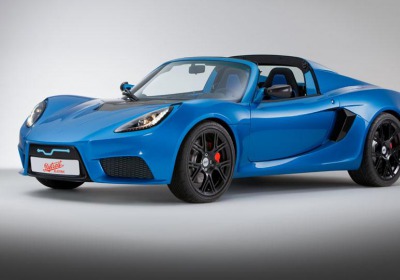Detroit Electric unveils the SP:01
Thu, 04 Apr 2013
Detroit Electric unveiled its SP:01 electric sports car April 3 in Detroit. The Lotus-based roadster claims 201 hp from its mid-mounted electric motor and a range of up to 180 miles from its lithium-polymer battery pack.
The company is headquartered in Detroit’s Fisher Building; it’s led by former Lotus Engineering and Lotus Group execs Albert Lam, Don Graundstadt and Benjamin Boycott.
The sports car is the beginning of Detroit Electric’s ambitious plans, though the company faces challenges. It doesn’t have a factory yet, though executives say one will be selected near Detroit by the end of April. The battery pack suppliers -- there are said to be two -- were not specified. Kits would be shipped to the Detroit site for assembly.
The funding is also unclear, though founder and CEO Lam said private investors from Europe, Asia and the United States have been secured. He did say Detroit Electric has enough money on hand to launch the SP:01.
The management team owns a large chunk of the company. Six employees are taking temporary space in the historic skyscraper north of downtown Detroit. The staff could grow to 30 once the space is expanded.
Detroit Electric will announce a partner later this month at the Shanghai motor show. While not revealing who it will be, Lam called it a “credible” partner with global reach.
The SP:01 closely looks like a lot like the Lotus Exige, but the company notes that the car is purely based on the Lotus small-car platform. The front and rear are where you find most of the changes from designer Jerry Chung. Two intakes channel air to condensers that supply conditioned air to the cabin and cool the battery.
In the back the SP:01 has a molded lower diffuser and four taillights. Three wheel styles and seven colors will be offered when the car begins production, expected to be at the end of August, with deliveries in September.
The bodywork is made of carbon fiber, contributing to the SP:01’s low curb weight of 2,403 pounds.
The lithium-polymer batteries are rated at 37 kWh. Detroit Electric says it will offer buyers a bi-directional interface, named 360 Powerback, that charges the car’s battery at 240 volts and also links back into the home power supply. So if the power goes out you can tap into the SP:01’s battery to run the house for a few hours. A full charge with the Powerback takes about four hours, the company says.
The SP:01’s electric motor is rated at 201 hp and 166 lb-ft of torque, turning the rear wheels through a four-speed manual transmission. Detroit Electric says the manual transmission is used to make best use of the motor’s instant maximum torque. The gearbox houses fifth and sixth gears, but Detroit Electric says they aren’t needed and are blocked off.
There’s also no need to depress the clutch when launching or stopping -- the electric motor just stops -- only to change gears on the fly. The company says first gear is good for around-town driving, second gear will take the car up to 60 mph and only above that speed are third and fourth required.
Detroit Electric says the sprint from 0-62-mph takes 3.7 seconds and the SP:01 tops out at 155 mph. A two-speed automatic transmission will also be offered but pricing will be announced later.
The Lotus chassis uses double wishbones in front and back and a front antiroll bar. The Eibach springs and Bilstein dampers are retuned for the SP:01’s weight distribution. AP calipers cover the front wheels, while Brembos stop the rears. The SP:01 gets regenerative braking, the power of which can be varied from inside the car.
The interior is mostly leather and carbon fiber, and the SP uses an in-car infotainment system named SAMI that links with a driver’s smartphone for navigation and music, to control interior lighting and monitor vehicle-system status. Owners can also use their phone to track the car, turn on the climate system and check the battery’s state of charge.
Detroit Electric plans to build 999 copies of the SP:01. It will be backed with a three-year, 30,000-mile warranty with an optional extension for the battery to five years, 50,000 miles. The base price is targeted at $135,000 making it more expensive than the Tesla Roadster and Fisker Karma.
Detroit Electric says it plans to put two more high-performance models into production by the end of 2014.
By Jake Lingeman and Greg Migliore

